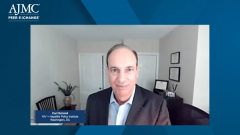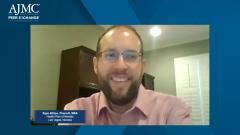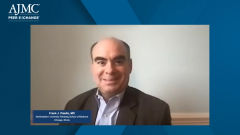
Unmet Needs for USPSTF Guidelines for HIV PrEP
Ryan Bitton, PharmD, MBA; Sean E. Bland, JD; Frank J. Palella, MD; and Carl Schmid comment on challenges in the implementation of USPSTF guidelines for HIV PrEP as well as existing unknowns with the guidance.
Episodes in this series

Ryan Haumschild, PharmD, MS, MBA: Ryan, what challenges overall have you experienced implementing this guidance? It takes time to implement. Obviously, that comes up, especially when we have these FAQs [frequently asked questions]. Have you had any challenges? Do you feel comfortable that you’re doing well in this space? Regarding the testing, supportive of PrEP [pre-exposure prophylaxis], working through this expediting, working through a medical necessity, is there anything that you feel is still a challenge or a barrier for you as a payer?
Ryan Bitton, PharmD, MBA: I’m not sure we’ve got any huge barriers remaining. Some challenges are around some of these drugs. All these drugs are approved for treatment as well as for prevention. That’s tough. You’ve got to have policies for both. Some of these drugs have multiple strengths, but it’s not well organized on the PDL [preferred drug list]. In a transparent format, how do we tell people about these benefits? Do we create other documents that say, “Here are your preventive benefits?” These drugs don’t have a $0 tier and don’t have a $0 co-pay. You have to worry about that. Will anybody read that? Where do I post that? Who’s the audience? There are a lot of challenges about how we get this out there in a format that people can understand. It’s not as complex. The communication I’ve had with providers and other groups has helped and gone a long way, but I haven’t had conversations with every provider in my network.
Ryan Haumschild, PharmD, MS, MBA: You did a great job talking through not barriers but challenges. I like how you clarified that. For the rest of the group—Carl or Sean, if you want to chime in—are there any other unknowns with this guidance that you’ve experienced, you’ve seen, you’ve heard from patients? How do you hope those will be clarified?
Carl Schmid: The guidance is good. They took a long time to do it, and they worked with the CDC [Centers for Disease Control and Prevention] and the patient community groups. Everything that we asked for, we got in the FAQ. It’s a solid document. Obviously with new PrEP on the horizon, it’s going to have to be updated for the future. The main issue is the enforcement—making sure the payers are following it and the patients are aware of it, getting the word out there—but the guidance is strong. It’s the enforcement. How are we doing with the exceptions and prior-authorization process? We still have to learn and hear from patients and providers on that.
Sean E. Bland, JD:I agree. This is strong guidance that we have, but it’s only meaningful if they’re actually complied with by health plans and if people being supported get access to PrEP. We’re going to need a lot more education, making sure everyone knows what the requirements are on the plan side for patients as well as for providers.
Ryan Haumschild, PharmD, MS, MBA: Excellent. Frank, do you have anything you wan to add?
Frank J. Palella, MD:I want to echo the comments of my colleagues. I’ll add that the spirit of any guidelines is that they are works in progress and will evolve as more information is gathered. As we learn more and encounter nuances in care and in patient characteristics and scenarios—involving PrEP and HIV preventive strategies—we will evolve. Some places where there’s room to grow include the use of longer-acting therapies, even injectable ones, for PrEP and the periodicity of some of those therapies. The 1 that’s the furthest in clinical development will be every 2 months, but others are coming down the pike that will be every 6 months or every year. We’ll get to the point where even with injectable therapies, the frequency of delivery of therapy is not necessarily linked to the frequency of follow-up.
The other aspect in the United States—as opposed to other parts of the world, like Europe—is that we don’t talk much about event-based PrEP, meaning PrEP taken by the individual. Whether or not you’re in favor of this strategy, it is in response to self-perceived risk for periods of time. At other times, in the case of daily PrEP, they may not take a daily pill. We need to learn more about that. For some people, that’s a preferable strategy that can enhance retention, and we need to explore how we could optimize those scenarios for patients, providers, and payers.
Transcript Edited for Clarity
Newsletter
Stay ahead of policy, cost, and value—subscribe to AJMC for expert insights at the intersection of clinical care and health economics.









